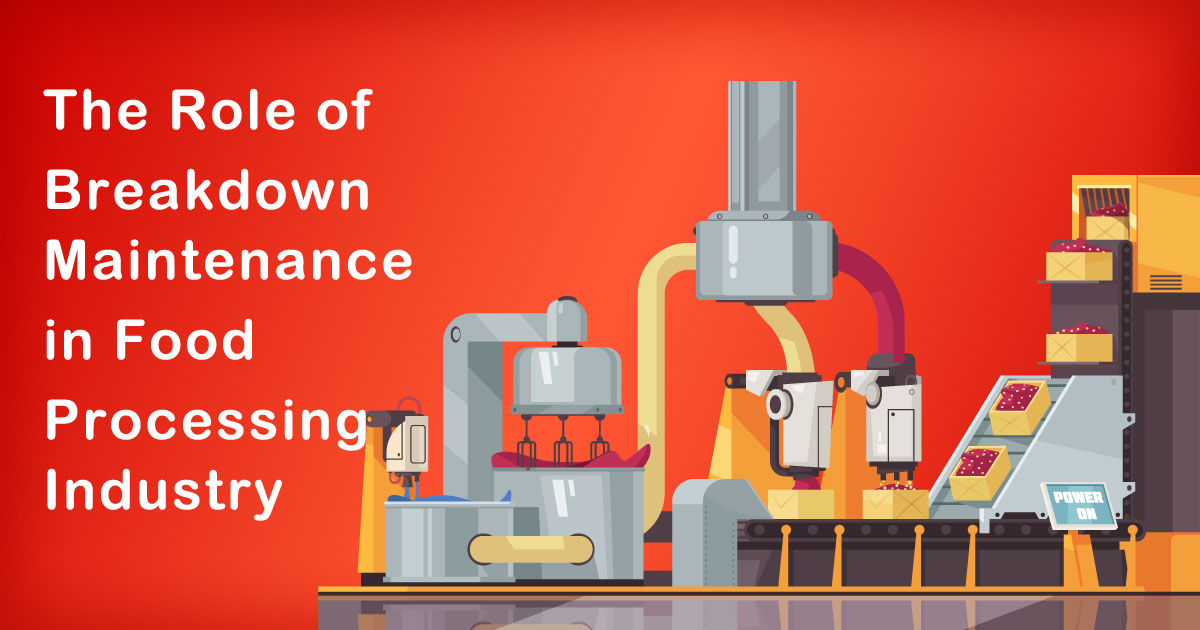Introduction
In the fast-paced world of food processing, timely production and consistent quality are paramount. The Indian food processing industry has witnessed remarkable growth over the years, owing to rising consumer demands and evolving preferences. To meet these demands, food processing plants must ensure uninterrupted operations and minimize downtime. Breakdown maintenance, a critical aspect of maintenance management, plays a pivotal role in keeping the industry running smoothly. In this blog, we will explore the significance of breakdown maintenance in India’s food processing industry, backed by research and relevant facts.
The Food Processing Boom in India:
India’s food processing industry has emerged as one of the largest in the world, contributing significantly to the country’s economy and employment. The industry encompasses various sectors, such as dairy, fruits and vegetables, grains, spices, beverages, and more. With a vast agricultural base, India enjoys abundant raw materials, creating favorable conditions for food processing businesses.
The High Cost of Downtime:
Downtime in food processing plants can be extremely costly, resulting in production losses, increased overheads, and compromised product quality. In an industry where perishable goods are involved, any interruption in the process can lead to spoilage, leading to significant financial losses. According to a study conducted by the Federation of Indian Chambers of Commerce & Industry (FICCI), the food processing industry loses billions of rupees annually due to unplanned downtime.
Understanding Breakdown Maintenance:
Breakdown maintenance, also known as reactive maintenance or run-to-failure maintenance, involves repairing equipment only when it breaks down. While some may argue that proactive maintenance strategies like preventive maintenance are more effective, breakdown maintenance has its role, especially for critical and low-priority equipment. However, relying solely on breakdown maintenance can lead to reduced overall equipment effectiveness (OEE) and increased production risks.
The Role of Breakdown Maintenance:
In the Indian context, where cost constraints may impact maintenance budgets, breakdown maintenance can be employed strategically. Research by the Indian Institute of Technology (IIT) Delhi suggests that applying breakdown maintenance to non-critical equipment and backup systems can save costs without significantly impacting overall production efficiency. However, it is essential to combine breakdown maintenance with other preventive and predictive maintenance practices to achieve optimal results.
Implementing Breakdown Maintenance Effectively:
To leverage the benefits of breakdown maintenance, food processing companies must adopt an integrated approach. Key steps include:
a. Equipment Prioritization:
Identifying critical equipment that requires immediate attention during breakdowns.
b. Monitoring and Analysis:
Installing sensor-based monitoring systems to track equipment health and predict failures before they occur.
c. Skilled Workforce:
Training maintenance personnel to respond swiftly and efficiently to breakdowns.
d. Spare Parts Management:
Ensuring the availability of critical spare parts to minimize downtime.
Mitigating Challenges
Breakdown maintenance has its challenges, particularly when it comes to managing breakdowns during peak production hours. By analyzing historical breakdown data and using advanced analytics, companies can better predict peak periods and plan maintenance accordingly.
Conclusion:
In the competitive landscape of the Indian food processing industry, breakdown maintenance plays a crucial role in ensuring uninterrupted operations and reducing downtime. While it may not be the sole maintenance strategy, when implemented effectively and judiciously, it can contribute significantly to cost savings and overall equipment efficiency. In light of the dynamic nature of the industry, an integrated approach that combines breakdown maintenance with preventive and predictive maintenance is the key to success. By embracing technology and investing in a skilled workforce, food processing companies can keep their machinery running smoothly and continue to cater to the ever-growing demands of the Indian market.








